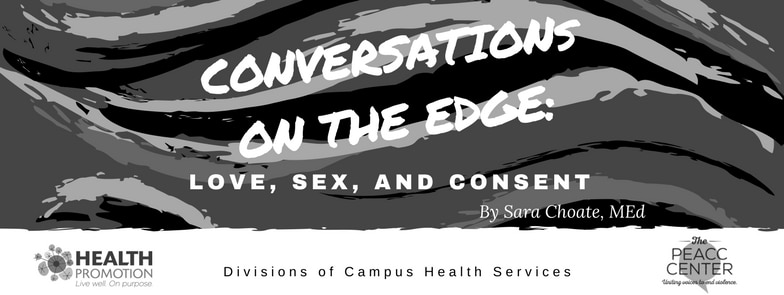This is a submission by a representative of University of Louisville Health Promotion, a division of Campus Health Services.
By Sara Choate —
I invite you to join our on-going conversation on the topic of consent. The word consent peppers much of our national dialogue these days. But what does it actually mean to you?
Let’s begin this month’s conversation by defining the concept as it relates to our daily lives. Unless you are a hermit, chances are good you are regularly seeking and giving consent with the people who are in your life. You invite a friend to a party. Your parent asks you about the outcome of your recent doctor’s visit. A new classmate asks to borrow your notes. In each of these scenarios, consent plays a part in your decision-making. If your friend doesn’t want to go, they may say no to your offer. You may feel uncomfortable sharing private lab results with your Mom. And, you may or may not want to share notes with your peer based on how much you like them. In the moments where we choose—yes, no, or maybe—we are engaging in the on-going dance of seeking and giving consent.
In the sexual and/or romantic realm, we also make lots of choices. Some are conscious and deliberate, while others may be more subconscious or spontaneous. It’s important to get in the habit of checking in with yourself in these situations. Respecting everyone’s limits while negotiating individual desires can be tricky. These questions will help you check in:
Are both you and your partner enthusiastic about what’s happening? If this is a new encounter with someone you don’t know very well or have just met, make sure there are clear signs that they’re into you and vice versa. Enthusiastic consent begins with mutual interest in each other. It’s also a good idea to make sure you’re in a balanced headspace, and that your partner is too. If either of you are feeling reckless, take a step back, and hold off on pursuing anything sexual.
Are you both clear about what you want out of this interaction? In our society, we are not encouraged to communicate openly about our desires or boundaries. And yet, we’re expected to know what another is thinking based only on non-verbal cues. Until we evolve to be mind readers, we have to use our words to convey our needs. Stating your desires and boundaries in a way that your partner can hear is crucial to getting what you want, and keeping your partner informed about what you’d like to explore.
Is consent freely given? If one partner is coercing another or guilting them into a sexual act, then the balance of power is out of whack. This can occur under certain circumstances like in couples where there is a significant age, income, or physical size difference. True equality in a relationship is the fundamental building block of consent. Keep in mind, legally in the state of Kentucky, you cannot consent if you’re not sober. This is a complicated issue, so we’ll unpack the topic of sober versus non-sober sex in our September conversation!
Finally, and this is important, you can change your mind at any time even if you’ve expressed interest previously, and your partner has to be okay with it. Period. If they push back on this, consider it a red flag for a potentially unhealthy and unsafe relationship.
We want to hear from you! If you’d like to contribute to next month’s conversation, please share your point of view on the topic of sober versus non-sober sex by emailing [email protected].





